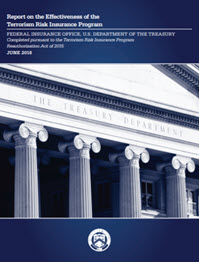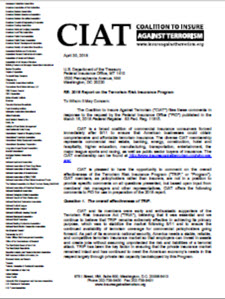The federal government’s Terrorism Risk Insurance Program has been effective in making terrorism risk insurance available and affordable throughout the United States, according to a recent report by the U.S. Department of the Treasury’s Federal Insurance Office.
 |
|
The Treasury based its June “Report on the Overall Effectiveness of the Terrorism Risk Insurance Program” on marketplace data collected for the past two years, along with public comments such as those submitted by the broad-based Coalition to Insure Against Terrorism (CIAT), which includes The Real Estate Roundtable. |
- The Terrorism Risk Insurance Program – authorized by the Terrorism Risk Insurance Program Reauthorization Act (TRIPRA) of 2015 – provides a federal backstop for certain U.S. property and casualty insurance losses resulting from a certified act of terrorism.
- Treasury based its June “Report on the Overall Effectiveness of the Terrorism Risk Insurance Program” on marketplace data collected for the past two years, along with public comments such as those submitted by the broad-based Coalition to Insure Against Terrorism (CIAT), which includes The Real Estate Roundtable.
- TRIPRA directs Treasury to provide reports on the Program’s effectiveness and estimate the total amount of premiums earned on terrorism risk insurance since January 1, 2003. Treasury published its first Program effectiveness report two years ago. (Roundtable Weekly, July 8, 2016).
- In last month’s report, Treasury’s estimate of total earned premiums for terrorism risk insurance from 2003 to 2017 is approximately $37.6 billion (excepting captive insurers). This amount is between 1 and 2 percent of the total premiums earned in the Program-eligible lines of insurance during that period. Treasury estimates that an additional $7.4 billion has been earned by captive insurers.
- The total of terrorism risk premiums earned is comparable to the loss sustained by the insurance industry in connection with the attacks on September 11, 2001.
- While the purchase of terrorism risk insurance is not mandated by the Program, a significant proportion of commercial policyholders nationwide have elected to obtain such insurance, and take-up may be even higher in metropolitan areas at greater risk of terrorism.
Without Congressional action, the Terrorism Risk Insurance Program, authorized by TRIPRA, will expire on Dec. 31, 2020. The Roundtable is working with industry partners to develop a proposal that would make terrorism insurance available for the long-term.
